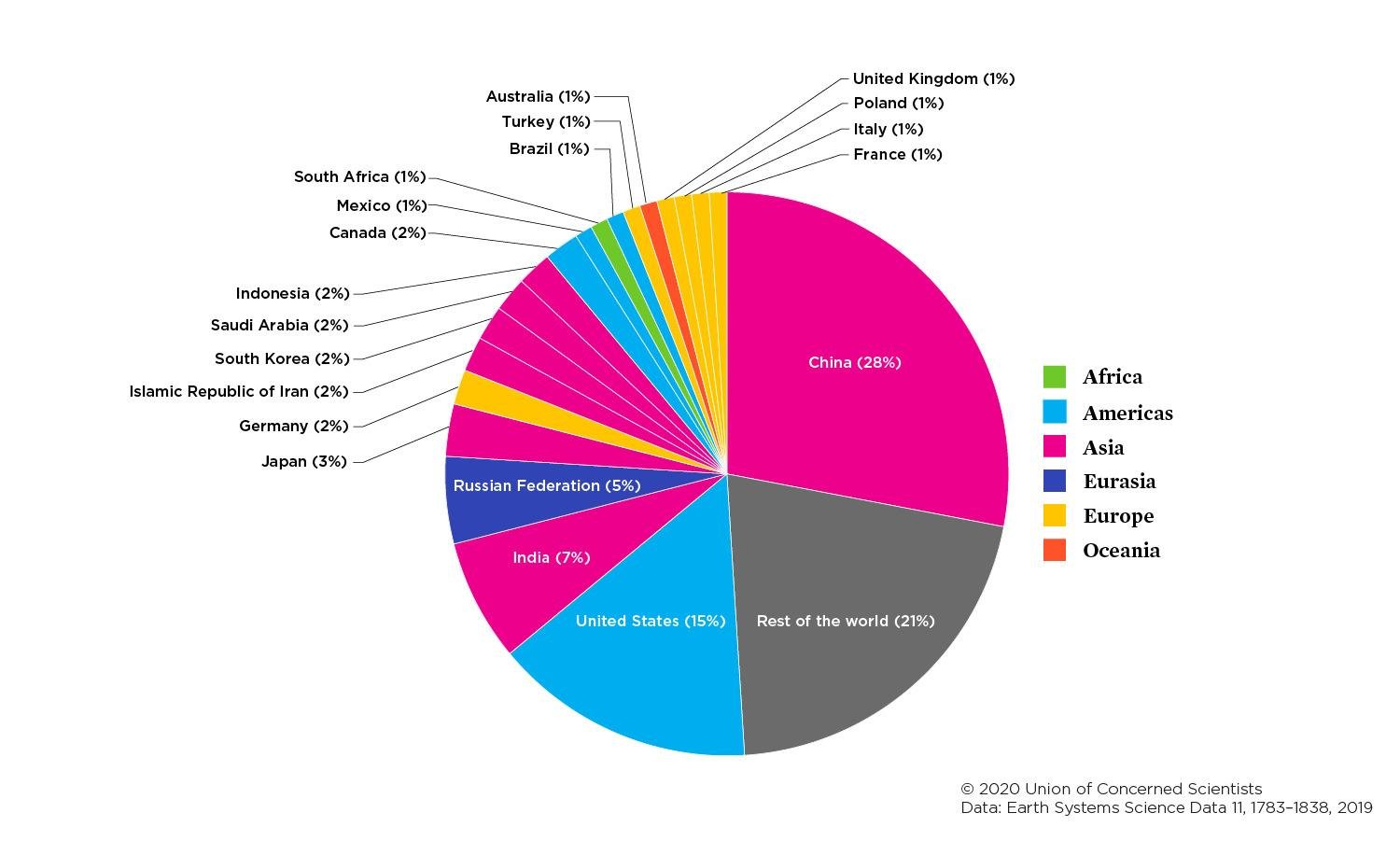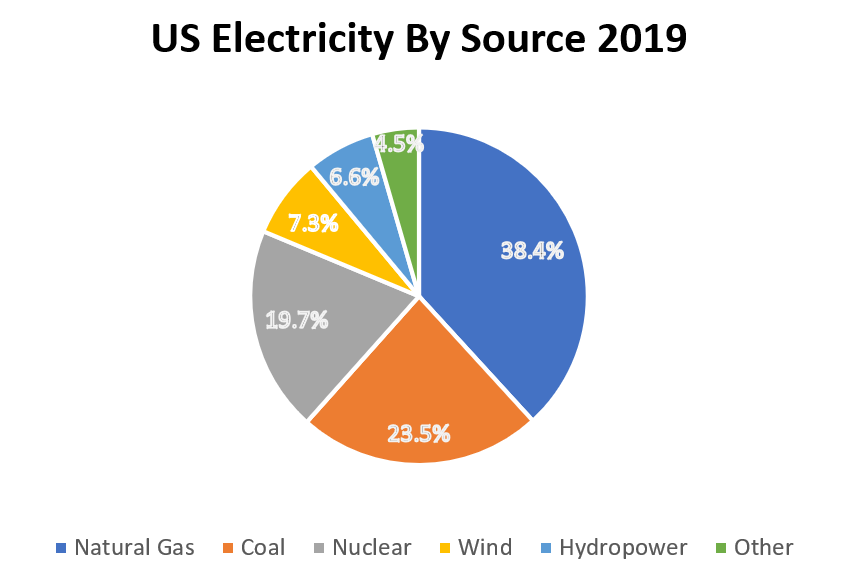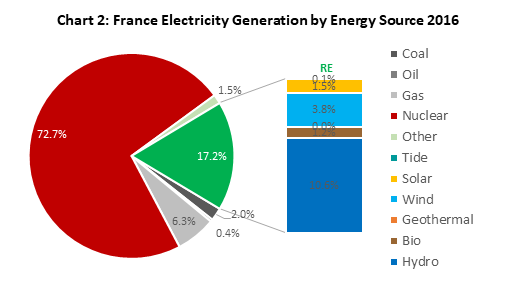-
 Count Timothy von Icarus
4.3k
Count Timothy von Icarus
4.3k
Everyone. There are more humans on Earth than we have the ability to sustain without releasing GHGs that in turn warm the planet.
Some have a larger impact than others. The US, Canada, and Australia have the highest emissions per person. Part of this is climate. North America is a lot less temperate than Europe. Massachusetts towns have lower average winter lows than Moscow or Helsinki, with the Mid-West being significantly colder, while large part of the population lives in deserts that are far hotter. More energy is required for heating and air conditioning. Much lower population density as well as intentional policy decisions to support cars over public transport also feed into it. Some poorer countries have surprisingly large carbon outlays though, Iran is on par with Europe. Poorer countries tend to use less.
That will likely change over time though. Technology offers a lot of ways for wealthy countries to reduce net emissions, so poorer countries may eventually have higher net emissions per person, which isn't great since they will also continue to experience rapid population growth.
Probably the place to focus policy wise is on optional choices people make that increase emissions a lot. Living in large dwellings, a majority of Americans driving trucks or SUVs, eating meat every meal. It's particularly bad in the US. Protein, eating meat every meal, is marketed as a way to lose weight, instead of, you know... eating less. People think passenger cars will explode if they touch a gravel road. In fact, every car I've owned I've taken up dirt roads for camping, even used to bring a crappy Ford station wagon up high clearance roads with the help of a wood board. Meanwhile people with Jeeps end up crashing them in 5 inches of snow in the South. We probably add at least another large country's worth of emissions because people refuse to learn to drive. Although really it's more of a fashion statement. Somewhere in the last 15 years using a pick up as the family vehicle became stylish. -
 Thunderballs
204There are more humans on Earth than we have the ability to sustain without releasing GHGs that in turn warm the planet. — Count Timothy von Icarus
Thunderballs
204There are more humans on Earth than we have the ability to sustain without releasing GHGs that in turn warm the planet. — Count Timothy von Icarus
Do you think Earth is over-populated? I used to think no. But then I learned way back there were only max one million people on Earth. And only a few white tigers are left now. And even less pandas.
I'm not sure all people can't be sustained without emitting GHS's. -
 ssu
9.8k
ssu
9.8k
Sure. But even if per capita stats show who use energy the most, for things like climate change the real issue are the aggregate emissions:Some have a larger impact than others. The US, Canada, and Australia have the highest emissions per person. — Count Timothy von Icarus

It's telling that altogether France, Germany, UK and Japan in the aggregate emit just half of what the US does, even if the combined population of these countries is bigger than the population of the US. There's the real effect of selected energy policy. And naturally China is the biggest emitter (28%), but India just 7% even if the populations start to be on par (there are only 59 million fewer Indians than Chinese).
So the real issue is for India not to pick the way of Coal plants, but for example renewable energy and nuclear. -
 Thunderballs
204It's telling that altogether France, Germany, UK and Japan in the aggregate emit just half of what the US does, even if the combined population of these countries is bigger than the population of the US — ssu
Thunderballs
204It's telling that altogether France, Germany, UK and Japan in the aggregate emit just half of what the US does, even if the combined population of these countries is bigger than the population of the US — ssu
What's done differently in the US? Are the most billionaires made in the US? -
 ssu
9.8kWhat's done differently in the US? — Thunderballs
ssu
9.8kWhat's done differently in the US? — Thunderballs
Let's start with the sources where countries get their electricity. Here's the pie chart for the US in 2019:

Then let's compare this to France:

Do you spot any difference? Hint: using Nuclear energy doesn't produce emissions creating climate change. Here you can see the effects of energy policy. That coal power plants produce nearly a third of the electricity in the US and only 2% of the electricity in France matters.
And this is just electricity production... -
 Thunderballs
204
Thunderballs
204
What many fossile plants in the US? I thought it was nuclear energy that banged the main drum! Would be nice if fusion worked. Although, creating the Sun on Earth... -
 ssu
9.8k
ssu
9.8k
Nuclear lobby is quite miniscule and not so strong. Besides, Coal mining has earlier been important employer for example in the Appalachian range, so it's no wonder that a populist politician declared himself of supporter of Coal. Got the votes from from the rust belt!What many fossile plants in the US? I thought it was nuclear energy that banged the main drum! — Thunderballs

-
 Thunderballs
204Nuclear lobby is quite miniscule and not so strong. Besides, Coal mining has earlier been important employer for example in the Appalachian range, so it's no wonder that a populist politician declared himself of supporter of Coal. Got the votes from from the rust belt! — ssu
Thunderballs
204Nuclear lobby is quite miniscule and not so strong. Besides, Coal mining has earlier been important employer for example in the Appalachian range, so it's no wonder that a populist politician declared himself of supporter of Coal. Got the votes from from the rust belt! — ssu
I know that politician! Even here his false Trumpet tones can be heard! Every time the stories from your country amaze me (assuming it's your country). The basic rules are so pretty though. As are the words under the statue of liberty. About the poor... -
 stoicHoneyBadger
211People like blaming natural disasters on someone, be it witches, jews or now folks driving SUVs. :)
stoicHoneyBadger
211People like blaming natural disasters on someone, be it witches, jews or now folks driving SUVs. :)
I carefully checked the science behind the so called 'CO2 emissions cause climate change theory' and found it to be basically baseless. You can blame the UFO or Yetis for that with equal proof. :) -
 Thunderballs
204SUVs. :)
Thunderballs
204SUVs. :)
I carefully checked the science behind the so called 'CO2 emissions — stoicHoneyBadger
"So called" emissions? They're pretty real. How did you carefully check that? -
 stoicHoneyBadger
211"So called" emissions? They're pretty real. How did you carefully check that? — Thunderballs
stoicHoneyBadger
211"So called" emissions? They're pretty real. How did you carefully check that? — Thunderballs
I started from the point of view of philosophy of science, i.e. what is science?
In brief, we have exact science, such as physics, chemistry, mathematics, etc. which is based on knowing all relevant factors and an ability to carry out a repeatable experiment.
Next we have non-exact science, such as economics or psychology, where we don't know all the relevant factors, nor can we carry out experiments. We can only rely on observations, build models and attempt to draw conclusions. It is much less accurate and can have multiple 'schools of thought' on the same subject, like Freudian vs Jungian, Austrian economics vs Keynesian, etc.
Finally we have pseudo-science, such as homeopathy, cryptozoology, astrology, etc. they take some proposition as a priory true and start building all their knowledge base on that.
For example, "like cures like" or "position of the plants at the time of ones birth will affect his life", etc.
I would ague that "climate science" in the form currently promoted by IPCC falls into the pseudo-science category, as it takes the idea of "industries emit CO2, which causes global warming, which will cause horrible natural disasters, which should be avoided at all costs" as a dogma.
In reality, it all falls apart if you ask
what is the optimal greenhouse effect for our planet?
what is the optimal CO2 level?
what is the optimal temperature and how do you measure it?
how do you tell apart natural climate variations vs those, causes by human activity?
is there a provable causal link between CO2 and temperature?
what are the pros and cons if we continue emitting CO2?
what are the pros and cons if we cut down the emissions?
knowing that human like to ascribe agency to natural disasters, how to we know if a certain disaster is worsened by "climate change" or, maybe, lightened?
I think you would agree that without a scientific answer to the above questions this discipline can not be taken seriously. -
 Wheatley
2.3k
Wheatley
2.3k
As if the IPCC is the only legitimate organization "promoting" climate change... :scream:I would ague that "climate science" in the form currently promoted by IPCC — stoicHoneyBadger
https://en.wikipedia.org/wiki/Category:Climate_change_organizations -
 stoicHoneyBadger
211As if the IPCC is the only legitimate organization "promoting" climate change... :scream: — Wheatley
stoicHoneyBadger
211As if the IPCC is the only legitimate organization "promoting" climate change... :scream: — Wheatley
they all are based on the same idea, aren't they? ;) such as there might be lots of 'schools' of astrology. -
 stoicHoneyBadger
211Who cooked up the idea? — Wheatley
stoicHoneyBadger
211Who cooked up the idea? — Wheatley
I didn't go too deep into the history of this matter, but probably the UN did. -
 Thunderballs
204such as there might be lots of 'schools' of astrology. — stoicHoneyBadger
Thunderballs
204such as there might be lots of 'schools' of astrology. — stoicHoneyBadger
All these astrology schools make different predictions. Which one is the right one? Are these predictions self-fulfilling? Who knows? Im no astrologist. In the case of climate I trust science models. The subject matter is best approached by science of the atmosphere (music of the atmosphers...). Not by astrology. Although very complex, predictions can be made and they are already coming through (though I already in my younger days thought bad things were inevitable, without knowing the exact science). Are you a climatologist in disguise? -
 stoicHoneyBadger
211Are climate models are more accurate than the weekly horoscopes?
stoicHoneyBadger
211Are climate models are more accurate than the weekly horoscopes?
Can they predict anything even a month in advance? If not, why should we trust their prediction decades ahead? Especially if they were wrong so many times? ( entire nations under water by 2020 )
I am not a climatologist, nor am I an astrologist or a homeopath. ;) -
 Thunderballs
204Are climate models are more accurate than the weekly horoscopes? — stoicHoneyBadger
Thunderballs
204Are climate models are more accurate than the weekly horoscopes? — stoicHoneyBadger
Yes. Absolutely. In personal affairs astrologists perform better than scientists though. -
 stoicHoneyBadger
211So what is the optimal level of greenhouse gases for our planet? do you agree that without knowing it, all the following thinking is futile?
stoicHoneyBadger
211So what is the optimal level of greenhouse gases for our planet? do you agree that without knowing it, all the following thinking is futile? -
 ssu
9.8k
ssu
9.8k
Those simply aren't the same things.Can they predict anything even a month in advance? If not, why should we trust their prediction decades ahead? — stoicHoneyBadger
I can make the prediction that in 200 years everybody participating in this Forum now will be dead. I think you can agree that my prediction is extremely likely to be true. But I cannot predict who is the person now participating in this Forum who will die next. The most likeliest are those who are old or who have a very bad health condition. Yet the sample size is so low that statistics don't help us much. -
 Thunderballs
204I can make the prediction that in 200 years everybody participating in this Forum now will be dead. — ssu
Thunderballs
204I can make the prediction that in 200 years everybody participating in this Forum now will be dead. — ssu
:victory: -
 stoicHoneyBadger
211I can make the prediction that in 200 years everybody participating in this Forum now will be dead. — ssu
stoicHoneyBadger
211I can make the prediction that in 200 years everybody participating in this Forum now will be dead. — ssu
Such prediction is based on simple observation that people live way less than 200 years. What does it have to do with climate? -
 Cabbage Farmer
301
Cabbage Farmer
301
What are you asking here? What does the fact that climate changes in the course of geological time have to do with our reaction to the problem in the present? As if you were to ask: "People have always suffered from malnutrition, disease, and war; so are malnutrition, disease, and war really all that bad, and things to be avoided?"We know already what. Is it even useful to ask if there is a blame? I mean, is climate change that bad? In Nature there have been a lot of climate changes. Only not in such a short time. Although the mass extinction event (the asteroid hit 60 million years ago in Yukatan caused a short term darkening and pretty high waves and Earthquakes. Although compared with Earth it was a tiny pebble moving in like a snail. — Prishon
Do you think it's a good idea to regulate economic activity on Earth so as to promote a stable global ecology? Or do you think it's a better idea to neglect to do so, even though we can, and even though that neglect is sure to result in death and destruction, economic and ecological instability on a massive scale -- to the detriment of millions or billions of human beings?
Everyone who is in position to take action to remedy the problem, and neglects to do so, is to blame. Everyone who takes action to obstruct remediation, or to make the problem worse, is to blame.Who is to blame? — Prishon
The people who are most to blame are those with the most capacity to promote a remedy but who neglect to do so, along with the people who obstruct the most, and the people who intensify the problem the most.
Like this bullshit artist. Here's the story about the interview from Unearthed:
Keith McCoy – a senior director in Exxon’s Washington DC government affairs team – told the undercover reporter that he is speaking to the office of influential Democratic senator Joe Manchin every week, with the aim of drastically reducing the scope of Biden’s climate plan so that “negative stuff”, such as rules limiting greenhouse gas emissions and taxes on oil companies, are removed. [...]
McCoy told an undercover Unearthed reporter that although he didn’t believe Exxon had buried its own science, the company had cast doubt on the scientific consensus: “Did we aggressively fight against some of the science? Yes. Did we hide our science, absolutely not. Did we join some of these ‘shadow groups’ to work against some of the early efforts? Yes, that’s true. But there’s nothing illegal about that. You know, we were looking out for our investments, we were looking out for our shareholders.” — Lawrence Carter, Unearthed, 6/3/21
What kind of monster thinks that "looking out for our investments" can possibly be a justification for promoting policies likely to produce catastrophic results for so many human beings?
Welcome to The Philosophy Forum!
Get involved in philosophical discussions about knowledge, truth, language, consciousness, science, politics, religion, logic and mathematics, art, history, and lots more. No ads, no clutter, and very little agreement — just fascinating conversations.
Categories
- Guest category
- Phil. Writing Challenge - June 2025
- The Lounge
- General Philosophy
- Metaphysics & Epistemology
- Philosophy of Mind
- Ethics
- Political Philosophy
- Philosophy of Art
- Logic & Philosophy of Mathematics
- Philosophy of Religion
- Philosophy of Science
- Philosophy of Language
- Interesting Stuff
- Politics and Current Affairs
- Humanities and Social Sciences
- Science and Technology
- Non-English Discussion
- German Discussion
- Spanish Discussion
- Learning Centre
- Resources
- Books and Papers
- Reading groups
- Questions
- Guest Speakers
- David Pearce
- Massimo Pigliucci
- Debates
- Debate Proposals
- Debate Discussion
- Feedback
- Article submissions
- About TPF
- Help
More Discussions
- Other sites we like
- Social media
- Terms of Service
- Sign In
- Created with PlushForums
- © 2026 The Philosophy Forum







